【教育资料】仁爱英语九年级上册Unit3 (Topic1Topic3)复习学案学习精品
仁爱版九年级英语上册 Unit 3 Topic 3 重难点知识归纳总结

仁爱版九年级英语上册 Unit 3 Topic 3 重难点知识归纳总结Topic 3 Could you give us some advice on how to learn English well?【重点单词】1.accent /ˈæksent/ n. 口音,腔调2.oral /ˈɔːrəl adj. 口头的3.dare /deə(r)/ v. 敢,敢于4.sleepy /ˈsliːpi/ adj. 想睡的,困倦的,瞌睡的5.final /ˈfaɪnl/ adj. 最终的,最后的6.real /ˈriːəl/ adj. 真实的,实际存在的;真正的7.retell /ˌriːˈtel/ v. 复述,重新讲述8.indirect /ˌɪndəˈrekt/ adj. 间接的,附带的9.granddaughter /ˈɡrændɔːtə(r)/ n. (外)孙女10.pronounce /prəˈnaʊns/ v. 发音,读(音)11.dialog /'daɪəlɒɡ/ n. 对白,对话position /ˌkɒmpəˈzɪʃn/ n. 作文;作曲;构成13.copy /ˈkɒpi/ v. 抄写;复印14.notebook /ˈnəʊtbʊk/ n. 笔记本15.diary /ˈdaɪəri/ n. 记事簿;日记,日记簿16.tape /teɪp / n. 磁带,录影带17.aloud /əˈlaʊd / adv. 大声地18.object /ˈɒbdʒɪkt / n. 物品,东西;目的,目标19.textbook /ˈtekstbʊk n. 教科书,课本20.ability /əˈbɪlətɪ/ n. 能力;才能21.toothpaste /ˈtuːθpeɪst/ n.牙膏22.preview /ˈpriːvjuː / v. 预习;预告23.review /rɪˈvjuː/ v. 复习;回顾n. 复习;复查;评论24.translate /trænzˈleɪt/ v. 翻译25.discussion /dɪˈskʌʃn/ n. 讨论,谈论,商讨26.exactly /ɪg'zæk(t)lɪ/ adv. 精确地,确切地27.honor /ˈɒnə(r)/ n. 尊敬,荣幸v. 给予表扬(或者奖励、头衔、称号);尊敬,尊重28.chant /tʃɑːnt n. 重复唱的歌词;圣歌29.achieve /əˈtʃiːv/ v. 达到,获得;成功30.easily /ˈiːzəli/ adv. 容易地,轻易地31.download /daʊn'ləʊd/ v. 下载32.actually /ˈæktʃuəli/ adv. 的确,事实上33.effective /ɪˈfektɪv/ adj. 有效的,产生预期效果的34.imitate /ˈɪmɪteɪt/ v. 模仿,仿效【重点短语】1.be afraid of doing sth. 害怕做某事2.at times有时3.feel like doing sth. 想要做某事4.give up 放弃5.ask sb. for help 向某人寻求帮助6.be good at 擅长于7.in public当众8.take part in 参加9.keep a diary 写日记10.give sb. some advice on/about... 给某人一些有关……的建议11.be weak in 不擅长12.make mistakes 犯错13.stick to (doing) sth. 坚持(做)某事14.take a deep breath 深呼吸15.take notes 记笔记16.prefer doing sth. 更喜欢做某事17.agree with 同意18.advise sb. to do sth. 建议某人做某事19.as often as possible 尽可能经常地20.remember to do sth 记得去做某事21.as long as 只要22.have no chance to do sth. 没有机会做某事23.practice doing sth. 练习做某事【重点句型】1.Could you make yourself understood in the USA?在美国,你能让别人懂得你的话吗?2.I don’t know what to do.我不知道该怎么办。
2024年中考英语仁爱版一轮复习+九年级上册+Unit+1+Topic+3+课件

词汇
用法
manage to 指经过努力和克服困难后将某事完成,强调结果。
do sth.
try to do 指尽力做某事,强调主观态度。
sth.
Tim tried to win the game. 蒂姆努力去赢得比赛。
考点精练2 1. My respected teacher always encourages me in my study.
up. Then you’ll succeed. — OK, I will. Thanks a lot.
A. Whatever C. Whenever ( C )8. — How long have you — Since two years ago.
B. However China?
A. come to
There are many reasons why so many people are 3. homeless (home). Sometimes that’s because they do not earn enough money 4. or do not have a job. Sometimes that’s because they have a problem with drugs or a mental 5. illness (ill). It’s true that no one is homeless 6. on purpose.
( B )6. — Why do you come here?
— We are here to provide the public
services.
A.
Ⅲ
( A )7. —
you do, you should try your best and never give
仁爱版英语九年级上册Unit3 Topic3 语法知识归纳

Unit3 Topic3 语法知识归纳(一)派生词和复合词(1) 派生:就是在一些词的后面加上前缀或后缀,构成一个新词。
①表示否定的前缀。
如:un-, dis-等。
unhappy, dishonest.②表示程度或大小的前缀。
如:super-, mini-等,superman,minibus.③表示位置,时间或顺序的前缀。
如:fore-, re-等,forehead, retell.④其他前缀。
如:a-, kilo-等, alive, kilogram.⑤名词后缀。
如:-er, -ment等,teacher, agreement.⑥形容词后缀。
如:-ful, -y等,useful, dirty.⑦动词后缀。
如:-ize, -en等,modernize, widen.⑧副词后缀。
如:-ly等,happily.(2)合成:是指由两个或两个以上的独立的词合成一个新词。
合成词有的用连字符号连接,有的不同。
它又分成合成名词,合成形容词,合成代词,合成副词5种。
如:①合成名词,如:spaceship, hometown等。
②合成形容词,如:kind-hearted(好心的)good-looking (好看的)等。
③合成代词,如:somebody, anything等。
④合成动词,如:underline, overwork等。
⑤合成副词,如:sometimes, nearby等。
(二)疑问代词(副词+动词不定式)疑问代词(副词)+动词不定式的功能:动词不定式和疑问代词who, who, which不定式”结构。
它在作用上及疑问副词how, where, when连用,构成“疑问词+相当于一个wh —词引出的名词性从句,常用在某些动词(如tell, know, imagine, learn, decided, forget, remember, consider, understand等)后面作宾语,还可作主语、宾语、表语等。
仁爱版英语九年级Unit1Topic3知识点

Unit 1 Topic 3(Grade Nine)Ⅰ、词组及用法1、be/get used to sth/doing sth 习惯于…used to do sth 过去常常做…used to be+名/形过去常常是…eg. Tom gets/is used to getting up early.Jane used to go to school by bus.David used to be thin,but now he’s fat.2、as a matter of fact=in fact 事实上3、go to plays 去看表演go to concerts 去听音乐会go to operas 去听歌剧4、come for a visit 来参观5、in need 处在困难时A friend in need is a friend indeed. 患难朋友才是真朋友6、decide on sth 决定,选定某事decide to do sth 决定做…eg. They decide on the best way to learn English.She decided to buy the car at last.7、provide sb with sth=provide sth for sb 提供某人某物/为某人提供某物eg. We provided the hungry children with the food.We provided the food for the hungry children.8、offer sb sth=offer sth to sb(主动)提供某人某物eg. He offered me a cup of tea.He offered a cup of tea to me.9. afford sb sth=afford sth for sb 为某人负担…eg. They afford us food=They afford food for us.10、so that=in order that+从句以便于,为了…eg. They study hard so that/in order that they can find a good job in the future.in order to do sth 为了去做某事eg. He gets up early in order to catch the early bus.11、feel good about…对…感觉好feel good about oneself 自我感觉良好12、pick up 拾起,捡起,(开车)接人eg. Don’t worry. I’ll pick you up at your school gate.13、help sb out 帮助某人摆脱(困境)Peter has some trouble in his Chinese,let’s help him out.14、on purpose 故意地,有意地15、support V.支持,支撑,供养eg. The government in every country has worked for many years to support the homeless.give support(n.)to sb=give sb support 为某人提供帮助eg. We should do our best to give support to the poor children.16、think of…as…=regard…as…把…视为…,把…看成…eg. Our English teacher thinks of us as her friends.18、an education program 一项教育事业19、raise money 筹钱raise one’s hand 举手raise their children 供养孩子20、make a contribution/contributions to sth/doing sth 为…做贡献eg. He made a contribution to Project Hope.I think everyone should make a contribution to protecting the environment.21、as a result 结果22、encourage sb to do sth 鼓励某人去做某事eg. My teacher encouraged me to join the sports club.23、continue(不及物动词)继续,持续Wet weather may continue for a few more days.continue(及物动词)+名/doing…继续…eg. Jim decided to continue his talk to Rose.Lily continued calling her mother up.24、whatever=no matter what 无论什么Whatever you do,you must do your best.25、manage to do sth 设法做成某事eg. They managed to get to the airport in time(及时)26、according to …根据…27、have/has been in …一直在某处eg. He has been in Beijing for three weeks.Ⅱ、语法1、since与forsince+时间点eg. He has worked in the factory since 1998.since+时间段+agoeg. She has been a doctor since two years agosince+一般过去时从句eg. Many things have changed since you left.It’s/has been+时间段+since+从句(过去时)eg. It’s/has been two years since she became a doctor.for+时间段eg. She has stayed in Beijing for three months.2、短暂性动词与持续性动词die——be dead buy——haveleave——be away(from)borrow——keepclose——be closed begin——be onjoin——be a member of …/be in…come to——be in/at…open——be open finish——be overcome——be backeg.①She bought a dictionary three days ago.She has had a dictionary for three days.②They came here yesterday.They have been here since a day ago.③His father joined the Party in 1990.His father has been in the Party since 1990.④I borrowed the book from the library two weeks ago.I have kept the book from the library for two weeks.。
仁爱版九年级英语上册 Unit 3 Topic 1 复习课 教案

学生书写句子部分情况。学生即将,中考在教学过程中,注重结合中
考习题模式训练,学生操练为主,强调学生书写练习与阅读,为写作
做准备。
板书设计 Unit 3 Topic1 复习课
1.词汇,speak-speaker, foreign-foreigner, possible-impossible, tour-tourist 2. Passive Voice: be+V 过去分词
1. 整体设计思路、指导依据说明
我所上的九年级的复习课。课堂以中考复习为方向,以中考命题训练位出发点,结合 整个 topic 的内容,复习被动语态,完成恰当的练习。学生观察总结为主,教师引导解惑为 辅,来完成对课本单词,短语,句子和考点的复习。
2. 教学背景分析:
教学内容分析: 本话题围绕 Kangkang, Li Xiang, Wang Junfeng 谈论去迪士尼乐园游玩这一话题,学习
习(25 分钟) 下。
种时态的被动语态。 动语态的转换。
3.情景写句子
5. 学生看图片,结合 5.被 动 语 态 造 句
情景的滋润,怎么会绽放那么多美好的灵魂之花!
仁爱版英语九年级上册
4.阅读短文,回答问 4.学生阅读短文,回答 1.培 养 阅 读 习 惯
被动语态复 题
3.掌 握 本 话 题 重 要词汇
1.安 排 中 考 练 习 题
型:辨音题和词汇 1. 做练习,掌握重要 1, 练习检测
题
词汇的书写
2.本话题的词组练 2.做练习,掌握词组。 2.练习检测 习
1.情景导入。
1.学生听对话,完成句 1. 把握被动语态
子。
的核心成分
被 动 语 态 复 2.被动语态句子改 4. 学生做练习,巩固 3 4.主 动 语 态 和 被
仁爱版九年级英语上册Unit1 Topic 3 复习教案
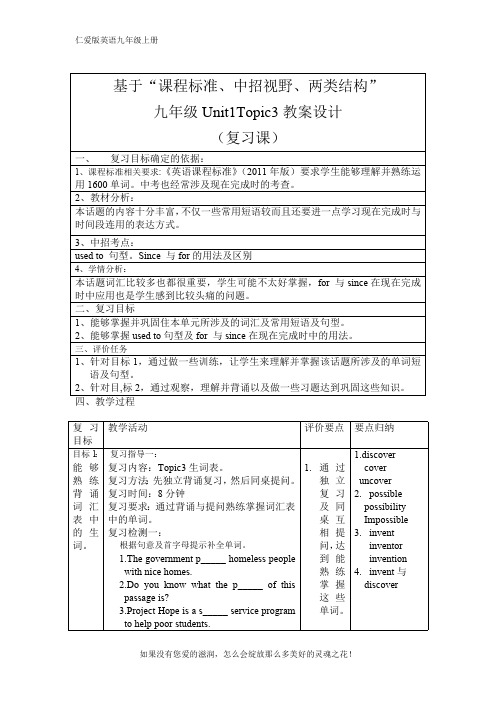
基于“课程标准、中招视野、两类结构”九年级Unit1Topic3教案设计(复习课)一、复习目标确定的依据:1、课程标准相关要求:《英语课程标准》(2011年版)要求学生能够理解并熟练运用1600单词。
中考也经常涉及现在完成时的考查。
2、教材分析:本话题的内容十分丰富,不仅一些常用短语较而且还要进一点学习现在完成时与时间段连用的表达方式。
3、中招考点:used to 句型。
Since 与for的用法及区别4、学情分析:本话题词汇比较多也都很重要,学生可能不太好掌握,for 与since在现在完成时中应用也是学生感到比较头痛的问题。
二、复习目标1、能够掌握并巩固住本单元所涉及的词汇及常用短语及句型。
2、能够掌握used to句型及for 与since在现在完成时中的用法。
三、评价任务1、针对目标1,通过做一些训练,让学生来理解并掌握该话题所涉及的单词短语及句型。
2、针对目,标2,通过观察,理解并背诵以及做一些习题达到巩固这些知识。
四、教学过程复习目标教学活动评价要点要点归纳目标1:能够熟练背诵词汇表中的生词。
复习指导一:复习内容:Topic3生词表。
复习方法:先独立背诵复习,然后同桌提问。
复习时间:8分钟复习要求:通过背诵与提问熟练掌握词汇表中的单词。
复习检测一:根据句意及首字母提示补全单词。
1.The government p_____ homeless peoplewith nice homes.2.Do you know what the p_____ of thispassage is?3.Project Hope is a s_____ service programto help poor students.1.通过独立复习及同桌互相提问,达到能熟练掌握这些单词。
1.discovercoveruncover2.possiblepossibilityImpossible3.inventinventorinvention4.invent与discover4.Some i_____ have changed our life. They make the world become better.5.As a m_____ of fact, she didn’t know the thing at all.目标2:能够掌握课本中出现重点单词短语及句型。
仁爱英语九上Unit3Topic3单词、词汇重点句型、语法等复习课件

Topic 3 It’s important to learn English well
一。重点词汇
• sleepy adj.困倦的 final adj. 最后的,
• grammar n. 语法 whom pron. 谁(宾格)
• weak adj. 弱的 dare modal v.敢,敢于
idea of the article.尽量猜测生词的意思,理解文章的大意。 • 5.I dare not answer questions in class, because I’m afraid of
making mistakes.我不敢在课堂上回答问题,困为我害怕犯错误。 • 6.It’s an honor to talk with all of you. • 与在座的各位交谈是我的荣幸。 • 7.But remember to choose the ones that fit you best. • 但是记住要选择最适合你的一种。 • 8.I insist that you practice English every day. • 我坚持认为你们每天都应该练习英语。 • 9.Believing in yourself is the first step on the road to success. • 自信是通往成功的第一步。
• 17.have a conversation with/ have a talk with.. 与…谈话
• 18. be in trouble
陷入困境
• 19.the final test
ห้องสมุดไป่ตู้
期末测试
• 20.make yourself understood
仁爱英语九年级Unit1Topic3学案教案
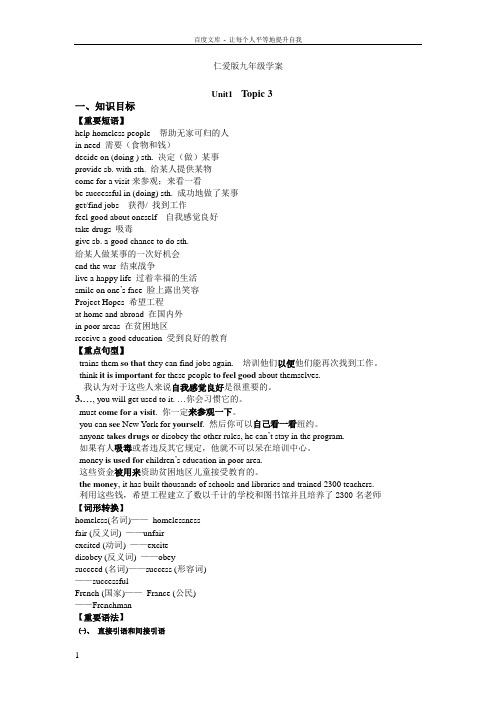
仁爱版九年级学案Unit1 Topic 3一、知识目标【重要短语】help homeless people 帮助无家可归的人in need 需要(食物和钱)decide on (doing ) sth. 决定(做)某事provide sb. with sth. 给某人提供某物come for a visit来参观;来看一看be successful in (doing) sth. 成功地做了某事get/find jobs 获得/ 找到工作feel good about oneself 自我感觉良好take drugs 吸毒give sb. a good chance to do sth.给某人做某事的一次好机会end the war 结束战争live a happy life 过着幸福的生活smile on one’s face 脸上露出笑容Project Hopes 希望工程at home and abroad 在国内外in poor areas 在贫困地区receive a good education 受到良好的教育【重点句型】trains them so that they can find jobs again. 培训他们以便他们能再次找到工作。
think it is important for these people to feel good about themselves.我认为对于这些人来说自我感觉良好是很重要的。
3.…, you will get used to it. …你会习惯它的。
must come for a visit. 你一定来参观一下。
you can see New York for yourself. 然后你可以自己看一看纽约。
anyone t akes drugs or disobey the other rules, he can’t stay in the program.如果有人吸毒或者违反其它规定,他就不可以呆在培训中心。
仁爱版 九年级英语 上册 Unit 1 topic 3知识点总结

Unit 1 The Changing World 知识点总结Topic 3 The world has changed for the better.129child labor 童工30cruel wars 残酷的战争31Project Hope 希望工程32By 2012, Project Hope had raised8.73 billion yuan. 到2012年啊,希望工程已经筹集了87.3亿元。
by+时间点:到…年/月/日,常与完成时态连用。
had+动词过去分词:过去完成时。
33make a contribution to sth 在某事上做出贡献to为介词,其后跟动词ing34encourage sb to do sth 鼓励某人做某事35the poor 穷人们the+形容词:表示这样一类人36the best-known【形】最著名的37receive help from sb 接受某人的帮助38continue doing sth 继续做某事语法解析现在完成时态Ⅲ1. 概念:过去的一个动作做到现在完成了或是还会继续,并且对现在造成了一定的影响。
2. 结构:have/has+动词过去分词3. 时间标志词:①for+一段时间:有…之久了。
例:I have been in China for ten years.(have been in+地点:呆在某地)②since+时间点:自从…以来。
例:I have been in China since ten years ago.4. 短暂性动词的完成时态不能和表示一段时间的时间状语连用,当它需要与表示一段时间的时间状语连用时,通常要进行转化。
注意:短暂性动词转为延续性动词:come —have been in; leave—have been away from; die—have been dead; buy—have had; begin—have been on; borrow—have kept; marry—have been married; catch a cold—have had a cold; close—have been closed; join—have been a member of…; fall ill—have been ill2。
仁爱版九年级上册Unit1 Topic3 知识点梳理
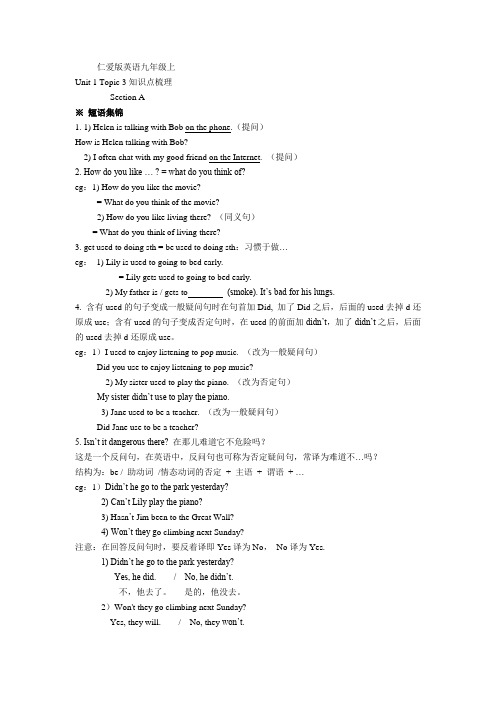
仁爱版英语九年级上Unit 1 Topic 3知识点梳理Section A※短语集锦1. 1) Helen is talking with Bob on the phone.(提问)How is Helen talking with Bob?2) I often chat with my good friend on the Internet. (提问)2. How do you like … ? = what do you think of?eg:1) How do you like the movie?= What do you think of the movie?2) How do you like living there? (同义句)= What do you think of living there?3. get used to doing sth = be used to doing sth:习惯于做…eg:1) Lily is used to going to bed early.= Lily gets used to going to bed early.2) My father is / gets to (smoke). It’s bad for his lungs.4. 含有used的句子变成一般疑问句时在句首加Did, 加了Did之后,后面的used去掉d还原成use;含有used的句子变成否定句时,在used的前面加didn’t,加了didn’t之后,后面的used去掉d还原成use。
eg:1)I used to enjoy listening to pop music. (改为一般疑问句)Did you use to enjoy listening to pop music?2) My sister used to play the piano. (改为否定句)My sister didn’t use to play the piano.3) Jane used to be a teacher. (改为一般疑问句)Did Jane use to be a teacher?5. Isn’t it dangerous there? 在那儿难道它不危险吗?这是一个反问句,在英语中,反问句也可称为否定疑问句,常译为难道不…吗?结构为:be / 助动词/情态动词的否定+ 主语+ 谓语+ …eg:1)Didn’t he go to the park yesterday?2) Can’t Lily play the piano?3) Hasn’t Jim been to the Great Wall?4) Won’t they g o climbing next Sunday?注意:在回答反问句时,要反着译即Yes译为No,No译为Yes.1) Didn’t he go to the park yesterday?Yes, he did. / No, he didn’t.不,他去了。
最新仁爱版英语九年级上册Unit1 Topic3知识点 整个话题完整版
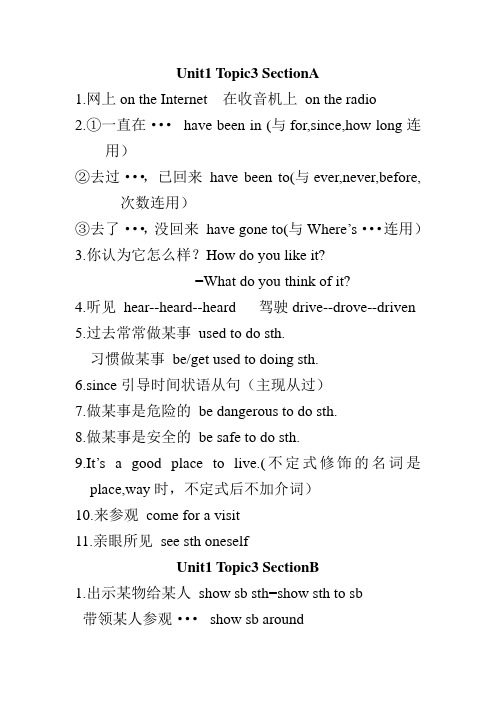
Unit1 Topic3 SectionA1.网上on the Internet 在收音机上on the radio2.①一直在···have been in (与for,since,how long连用)②去过···,已回来have been to(与ever,never,before,次数连用)③去了···,没回来have gone to(与Where’s···连用)3.你认为它怎么样?How do you like it?=What do you think of it?4.听见hear--heard--heard 驾驶drive--drove--driven5.过去常常做某事used to do sth.习惯做某事be/get used to doing sth.6.since引导时间状语从句(主现从过)7.做某事是危险的be dangerous to do sth.8.做某事是安全的be safe to do sth.9.It’s a good place to live.(不定式修饰的名词是place,way时,不定式后不加介词)10.来参观come for a visit11.亲眼所见see sth oneselfUnit1 Topic3 SectionB1.出示某物给某人show sb sth=show sth to sb带领某人参观···show sb around炫耀,卖弄show off 出现,露面show up=turn up 2.无家可归的人homeless people数百的hundreds of重返工作return to work3.过正常的生活live/have a normal life4.设法做成某事(结果一定成功)manage to do sth. 尽力做某事(结果不一定成功)try to do sth.5.一旦once (引导时间状语从句)6.since(引导时间状语从句,主现从过)7.in+名词①在需要时in need ②在困境中in trouble③在危险中in danger ④好健康in good health⑤好心情in a good mood8.①选定某物decide on sth②决定做某事decide to do sth③做决定make a decision9.为某人提供某物offer sb sth=offer sth to sbprovide sb with sth=provide sth for sb10.医疗medical treatment11.为了,以便于so that=in order that (后都跟从句)为了做某事in order to do sth.12.自我感觉良好feel good about oneself13.为···改变change for14.在许多方面in many waysP20:1.for,since,how long 现完,延动,be词组均延动非延动----延动die--be dead leave--be away (from)come--be in join--be in/ be a member ofbuy--have borrow--keepbegin/start--be on close--be closedopen--be open fall ill--be illmarry--be married2.陷入困境get in trouble3.拾起;接某人pick up4.处于救援氛围中in a helpful mood5.帮助某人走出困境help sb outUnit1 Topic3 SectionC1.最···之一one of +the+形容词最高级+可数名词复数最高男生之一one of the tallest boys2.①home (家,家乡,带有感情色彩)the home of ···②house(房屋,指建筑物本身,没有感情色彩)③family(家庭;家人)3.while 然而;当···时候;尽管4.短时期for a short period of time5.从一个地方到另一个地方from one place to another6.other+复名=others7.···的原因the cause of ···的影响the effect of8.无论什么whatever=no matter what9.raise 养育;筹集;(人为的)升起10.养家糊口support family给某人支持give sb support=give support to sb. 11.把···看作···think of···as = regard···as = treat···as12.有某方面的问题have a problem with···Unit1 Topic3 SectionD1.负担afford 不能负担做某事can’t afford to do sth2.截止by①by+过去时间(用于过去完成时)had+过分②by+将来时间(用于一般将来时)3.用这钱with this money4.援助某人做某事aid sb to do sth5.为···做贡献make a contribution to doing sth.6.两者都both···and7.最知名的the best-known8.结果as a result9.没有做某事without doing sth没有··的帮助without the help of10.风险,冒险risk11.八大时态:三“一”:一般现在时,一般过去时,一般将来时两“现”:现在进行时,现在完成时三“过”:过去进行时,过去完成时,过去将来时12.为··付款pay for13.在国内外at home and abroad。
仁爱版九年级英语上册 Unit 1 Topic 3 重难点知识归纳总结

仁爱版九年级英语上册 Unit 1 Topic 3 重难点知识归纳总结Topic 3 The world has changed for the better.【重点单词】1.block /blɑːk/;/blɒk/ n. 街道(区);(方形平面)大块2.artist /ˈɑːtɪst/ n. 艺术家,(尤指)画家3.visitor /ˈvɪzɪtə(r)/ n. 游客;来访者;参观者4.industry /ˈɪndəstri/ n. 行业;工业5.chemistry /ˈkemɪstri/ n. 化;化学物质6.term /tɜːm/ n. 学期;词语;措辞7.program /'prəʊɡræm/ n. 计划,方案;节目8.homeless /ˈhəʊmləs/ adj. 无家的9.manage /ˈmænɪdʒ/ v. 完成(困难的事);能解决(问题)10.treatment /ˈtriːtmənt/ n. 疗法,治疗11.immediately /ɪˈmiːdiətli/ adv. 立刻,立即conj. 一……就,即刻12.secretary /ˈsekrəteri/;/ˈsekrətri/ n. 秘书13.helper /ˈhelpə(r)/ n. 帮手,助手14.club /klʌb/ n. 俱乐部15.engineer /ˌendʒɪˈnɪə(r)/ n. 工程师,设计师16.wound /wuːnd/ n. 创伤;伤口17.basic /ˈbeɪsɪk/ adj. 基本的, 基础的18.human /ˈhjuːmən/ adj. 人的n. 人19.value /ˈvæljuː/ v. 重视,珍视n. 价值20.period /ˈpɪəriəd/ n. 一段时间,时期21.shelter /ˈʃeltə(r)/ n. 收容;遮蔽物22.homelessness /hoʊmləsnəs/ n. 无家可归23.earn /ɜːn/ v. 挣钱;挣得,赢得24.drug /drʌɡ/ n. 毒品;药,药物25.mental /ˈmentl/ adj. 精神健康的;思想的26.whatever /wɒtˈevə(r)/ pron. 无论什么,不管什么;任何事物27.effect /ɪˈfekt/ n. 影响,结果;效果28.steal /stiːl/ v. 偷,窃取29.suppose /səˈpəʊz/ v. 帮助,援助;支持30.phrase /freɪz/ n. 短语,词组31.according /ə'kɔːdɪŋ/ to 据……所说,按……所报道32.context /ˈkɒntekst/ n. 上下文;语境;背景borer /'leɪbərə/ n. 体力劳动者,劳工, 工人34.cruel /ˈkruːəl/ adj. 残酷的,冷酷的35.project /ˈprɒdʒekt/ n. 专题研究;项目;方案36.aid /eɪd/ v.&n. 援助;帮助37.primary /ˈpraɪməri/ adj. 小学教育的;主要的;最初的38.contribution /ˌkɒntrɪˈbjuːʃn/ n. 贡献;捐款39.encourage /ɪnˈkʌrɪdʒ/ v. 鼓励40.moral /ˈmɒrəl/ adj. 道德(上) 的41.development /dɪˈveləpmənt/ n. 发展,开发42.respect /rɪˈspekt/ v. 尊敬,尊重43.importance /ɪmˈpɔːtns/ n. 重要性,重要44.continue /kənˈtɪnjuː/ v. 持续,继续做45.college /ˈkɒlɪdʒ/ n.(美国)大学;(英国)学院【重点短语】1.get used to 习惯于ed to 过去常常3.as a matter of fact 事实上,其实4.provide sb with sth 为某人提供某物5.a short period of time 很短的一段时间6.be able to do sth 能够做某事lions of 大量的;数以百万计8.earn money 赚钱9.have a problem with sth 在某方面有问题10.on purpose 故意,有意地11.make a contribution to 为……做贡献12.as a result 结果是,因此【重点句型】1.How do you like living there?你觉得住在那里怎么样?2.Oh, you will get used to it soon if you come.哦,如果你来的话,很快就会习惯的。
仁爱版九年级英语上册 Unit 3 Topic 1 重难点知识归纳总结
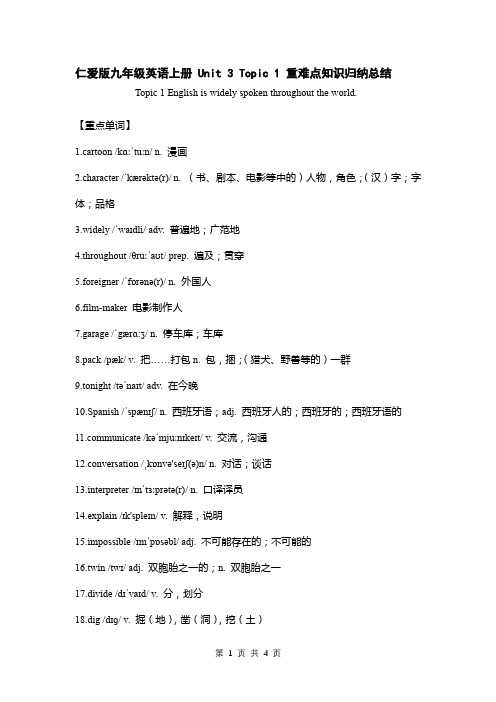
仁爱版九年级英语上册 Unit 3 Topic 1 重难点知识归纳总结Topic 1 English is widely spoken throughout the world.【重点单词】1.cartoon /kɑːˈtuːn/ n. 漫画2.character /ˈkærəktə(r)/ n. (书、剧本、电影等中的)人物,角色;(汉)字;字体;品格3.widely /ˈwaɪdli/ adv. 普遍地;广范地4.throughout /θruːˈaʊt/ prep. 遍及;贯穿5.foreigner /ˈfɒrənə(r)/ n. 外国人6.film-maker 电影制作人7.garage /ˈgærɑ:ʒ/ n. 停车库;车库8.pack /pæk/ v. 把……打包n. 包,捆;(猎犬、野兽等的)一群9.tonight /təˈnaɪt/ adv. 在今晚10.Spanish /ˈspænɪʃ/ n. 西班牙语;adj. 西班牙人的;西班牙的;西班牙语的municate /kəˈmjuːnɪkeɪt/ v. 交流,沟通12.conversation /ˌkɒnvə'seɪʃ(ə)n/ n. 对话;谈话13.interpreter /ɪnˈtɜːprətə(r)/ n. 口译译员14.explain /ɪk'spleɪn/ v. 解释,说明15.impossible /ɪmˈpɒsəbl/ adj. 不可能存在的;不可能的16.twin /twɪ/ adj. 双胞胎之一的;n. 双胞胎之一17.divide /dɪˈvaɪd/ v. 分,划分18.dig /dɪɡ/ v. 掘(地),凿(洞),挖(土)y /leɪ/ v. 放置,安放,搁20.mother tongue 母语21.root /ruːt/ n. 起源,根源;根;词根22.trader /ˈtreɪdə(r)/ n. 商人,买卖人23.native /ˈneɪtɪv/ adj. 出生地的,当地的24.speaker /ˈspiːkə(r)/ n. 讲(某种语言) 的人,发言者25.foreign /ˈfɒrən/ adj. 外国的26.base /beɪs/ n. 根据;根基;总部;v. 以……为基础(或根据)27.European /ˌjʊərəˈpɪə/ adj. 欧洲的28.kingdom /ˈkɪŋdəm/ n. 王国;管辖范围;领域29.tourism /ˈtʊərɪzəm/ n. 旅游业;观光30.conference /ˈkɒnfərəns/ n. (正式的)会议;商谈31.tourist /ˈtʊərɪst/ n. 旅游者;游客32.Britain /ˈbrɪtn/ n. 英国;不列颠33.powerful /ˈpaʊəfl/ adj. 强大的;有权势的;有影响力的34.leading /'liːdɪŋ/ adj. 最重要的,最成功的35.position /pəˈzɪʃən/ n. 位置;方位【重点短语】1.be able to 能够;会2.can’t wait to do sth. 迫不急待地要做某事3.have a (good) chance to do sth. 有(好)机会做某事4.from now on 从今往后,从现在开始5.on business 出差6.be pleased with 对……感到高兴;满意于……7.divide..into.. 把……分成8.be similar to 和……相似9.have no/some trouble (in) doing sth. 做某事没有/有些困难10.ask sb. for help 向某人寻求帮助11.as well as 以及,和12.mother tongue 母语13.take the leading position 处于领先地位14.encourage sb. to do sth. 鼓励某人做某事15.make great progress in doing sth在做某事方面取得很大进展16.be regarded as 被认为是【重点句型】1.Disneyland is enjoyed by millions of people from all over the world.世界上数以百万的人们都喜欢迪斯尼乐园。
【教育资料】仁爱英语 九年级上册Unit 1 Topic 3 课文翻译学习专用
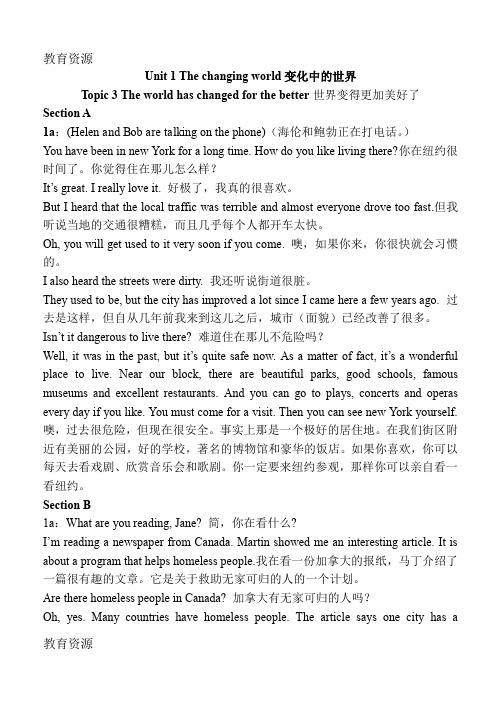
Unit 1 The changing world变化中的世界Topic 3 The world has changed for the better世界变得更加美好了Section A1a:(Helen and Bob are talking on the phone)(海伦和鲍勃正在打电话。
)You have been in new York for a long time. How do you like living there?你在纽约很时间了。
你觉得住在那儿怎么样?It’s grea t. I really love it. 好极了,我真的很喜欢。
But I heard that the local traffic was terrible and almost everyone drove too fast.但我听说当地的交通很糟糕,而且几乎每个人都开车太快。
Oh, you will get used to it very soon if you come. 噢,如果你来,你很快就会习惯的。
I also heard the streets were dirty. 我还听说街道很脏。
They used to be, but the city has improved a lot since I came here a few years ago. 过去是这样,但自从几年前我来到这儿之后,城市(面貌)已经改善了很多。
Isn’t it dangerous to live there? 难道住在那儿不危险吗?Well, it was in the past, but it’s quite safe now. A s a matter of fact, it’s a wonderful place to live. Near our block, there are beautiful parks, good schools, famous museums and excellent restaurants. And you can go to plays, concerts and operas every day if you like. You must come for a visit. Then you can see new York yourself. 噢,过去很危险,但现在很安全。
仁爱版英语九年级上册Unit3 Topic3 课文重难点讲解
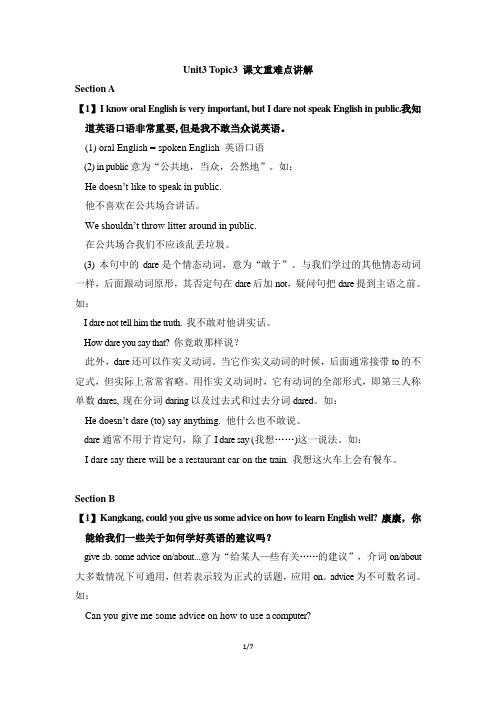
Unit3 Topic3 课文重难点讲解Section A【1】I know oral English is very important, but I dare not speak English in public.我知道英语口语非常重要,但是我不敢当众说英语。
(1) oral English = spoken English 英语口语(2) in public意为“公共地,当众,公然地”。
如:He doesn’t like to speak in public.他不喜欢在公共场合讲话。
W e shouldn’t throw litter around in public.在公共场合我们不应该乱丢垃圾。
(3) 本句中的dare是个情态动词,意为“敢于”。
与我们学过的其他情态动词一样,后面跟动词原形,其否定句在dare后加not,疑问句把dare提到主语之前。
如:I dare not tell him the truth. 我不敢对他讲实话。
How dare you say that? 你竟敢那样说?此外,dare还可以作实义动词。
当它作实义动词的时候,后面通常接带to的不定式,但实际上常常省略。
用作实义动词时,它有动词的全部形式,即第三人称单数dares, 现在分词daring以及过去式和过去分词dared。
如:He doesn’t dare (to) say anything.他什么也不敢说。
dare通常不用于肯定句,除了I dare say (我想……)这一说法。
如:I dare say there will be a restaurant car on the train. 我想这火车上会有餐车。
Section B【1】Kangkang, could you give us some advice on how to learn English well? 康康,你能给我们一些关于如何学好英语的建议吗?give sb. some advice on/about...意为“给某人—些有关……的建议”,介词on/about 大多数情况下可通用,但若表示较为正式的话题,应用on。
仁爱英语九年级上册 Unit 3 Topic 1学习笔记

仁爱九年级上册Unit 3 Topic 1学习笔记By Mr.Tan Section A 重点短语及句子1.have a look 看一看2.a poster of…一张……的海报3.on the wall 在墙上4.Guess what ! 你猜怎么着!5.be able to do sth. 能做某事区分:be able to 与canlions of 数百万7.all over the world 全世界=throughout the world=around the world8.one day 某一天9.be ready for 为……准备10.can't wait to do sth. 迫不及待地做某事11.have a good chance to do sth. 有一个好机会做某事12.be spoken as 作为……被说13.be widely used 被广泛使用14.be good at 擅长于15.a little 一点点16.Don’t worry 别担心17.try/do one’s best 尽某人最大努力18.from now on 从现在开始from then now 从那时开始19.t alk about 谈论20.as well as 和……一样好;和21.draw pictures 画画22.at last 最后=finally=in the end23.be pleased with 对……满意Section A 重点句型分析1. stick v. 粘贴,粘住。
e.g. Please stick this map of China on the wall. 请把这幅中国地图贴在墙上。
stick to意为“坚持;坚守(某种观点、主张、理想、真理、协议)”。
后跟名词。
e.g. He always sticks to his own decision. 他总是坚持自己的决定。
- 1、下载文档前请自行甄别文档内容的完整性,平台不提供额外的编辑、内容补充、找答案等附加服务。
- 2、"仅部分预览"的文档,不可在线预览部分如存在完整性等问题,可反馈申请退款(可完整预览的文档不适用该条件!)。
- 3、如文档侵犯您的权益,请联系客服反馈,我们会尽快为您处理(人工客服工作时间:9:00-18:30)。
Unit 3 Topic 1English is widely spoken throughout the world. *单词吧1.普遍地,广泛地(adv.)_______→______(adj.)...宽的→_______(n.) 宽度2.外国人(n.)_______→_______(adj.)外国的3.西班牙语(n.);西班牙人的(adj.)________→_______(n.)西班牙4.沟通,交流(v.)________→________(n.)沟通,交流5.口译译员(n)________→______(v.)口译6.解释,说明(v.)________→_________(n.)解释,说明,阐述7.不可能的(adj)______→______(adj.)可能的→______(adv.)可能,或许8.掘(地),凿(洞),挖(土)(v.)____ →_____(过去式)→____(过去分词)9.放置,安放(v.)_______ →________(过去式)→_______(过去分词)10.讲,说,谈话(v.)_______ →_______(过去式)→________(过去分词)→________(n.)讲某种语言的人,发言者11.欧洲的(adj.)______→________(n.)欧洲12.观光,旅游(n.)_______→旅游业,观光(n.)________ →_______(n.)旅游者,游客13.英国,不列颠(n)________→_______(n./adj.)英国的;英国人14.强大的,有权势的,有影响力的(n.)_______→______(n.)力量,权力15.率领,领导(v.)_______→______ (n.)领导者→最重要的,最成功的(adj.)________16.粘贴;粘住(v.)________ →_______(过去式)→____(过去分词)*短语园及句型坊1. Disneyland ____________ by _____________ people _______________________. 迪士尼被来自全世界的人所喜欢。
2. I hope I can go there ________________. 我希望有一天我可以去哪里。
3. Are you _________________ your trip? 你准备好你的旅行了吗?4. I ________________________ there. 我迫不及待要飞到那里去了。
5. You’ll __________________________________English there.你将有一个练习英语的好机会。
6. English ______________________ the ___________________ in America.在美国,英语被当做主要语言来说。
7. It is widely used throughout the world now. ______________________________8. I __________________ English. I’m _________________.我不擅长英语,我有一点点害怕。
9. __________________ and work harder ____________________.从现在起,尽你最大的努力并且更努力地工作。
1o. I’m going to Cuba ____________________________. 我今晚要去古巴出差。
11. Spanish is spoken as the official language in Cuba.________________________________________________________12. ______ Spanish ________________ English? 西班牙语和英语相似吗?13.It is ______________ for you to have trouble __________________?对你来说,可能交流有困难。
14.Many kids ____________________________ their parents. (get along with…)许多孩子与他们的父母相处有困难。
15. If necessary, I’ll ask an interpreter for help.________________________________16. The interpreter will _________________ you the _____________ of the country.口译员将向你解释这个国家的文化。
17._________________ the _____________ and the ___________ can help me work well.懂得那里的语言和文化有助于我的工作。
18. ______________________________! 我祝你你成功!19. In the past, the language _________________ around the world _______ English __________ and English _______________.在过去,这种语言被英国商人和英国政府在全世界传播。
20. Whatever language people speak, they need to know some English if they work in these fields. _________________________________________________________21._____________ the English language__________________.显而易见,英语变得更加重要了。
22. English is used in many different fields of life, such as business, tourism and technology._______________________________________________________23. The English language _____________________in our lives. 英语在我们的生活中发挥重要的作用。
24. __________the 1950s, the USA ________________ more and more powerful.自从20世纪50年代起,美国变得越来越强大。
25. The American computer and Internet industry have taken the leading position in the world. __________________________________________________________26. China, with ___________________ in the world, _________________ morepeople_______________ English_________________.有着世界最多人口的中国,自从20世纪70年代以来就鼓励更多的人学习英语。
27. Since the 1990s, English learning has been very popular with Chinese people.___________________________________________________________________28. Many of them have done well in English and have made great progress in speaking it.________________________________________________________29. Now students are required to learn English, and the study of English is regarded as a very important industry in China as well as the rest of the world.____________________________________________________________________*语法苑一般现在时的被动语态:结构_____________The cake was divided into pieces by her.(肯定句)________________________________(变否定句)_________________________________(变一般疑问句)__________________________________(肯定/否定回答)把下列句子改为被动句。
1. Some people destroy the environment.____________________________________2. He doesn’t water the flowers every day.___________________________________3. Does a large population cause many problems?______________________________4. They cleaned the classroom this morning.______________________________________Unit 3 Topic 2Some things usually have different meanings in differentcultures.*单词吧17._______(n.)陌生人→__________(adj.) 奇怪的,奇特的;陌生的18.航班飞机,空中航行(n.)_______→_______(v.)飞行,飞19.沉默;无声(n.)________→_______(adj.)沉默的;无声的;安静的20.困惑的(adj.)________→______(v./n)使…困惑;谜,难题21.误解,误会(n.)________→_________(v.)误解,误会→_______(过去式)→_______(过去分词)→_________(v.)理解22.不同地,有差异地(adv.)_______ →________(adj.)不同的,有差异的→______(n.)不同性23.诚实的;老实的;坦率的(adj.)_______ →________(adj.) 不诚实的24.奇妙的;有魔力的(adj.)______→________(n.)魔法25.皇帝(n.)_______→皇帝的;帝国的(adj.)________ →_______(n.)帝国26.勇气;胆略(n)________→_______(v.)鼓励→_______(n.)鼓励,鼓舞27.错误,失误;误解(n./v.)_______→_______(过去式)→_______(过去分词)28.骄傲,自豪(n.)________ →_______(adj.)骄傲的,自豪的29.智慧,精明(n.)________ →_______(adj.)聪慧的30.词语;表达,表情(n.)________ →_______(v.)表达31.拼写;拼法(n.)________ →_______(v.)拼写32.发音(n.)___________ →___________(v.)发音33.完全,全部地,整个地(adv.)________ →_______(adj./n.)全部的,完全的;总数*短语园及句型坊1.Michael and Kangkang are going to _____________.迈克和康康要去给他们送行。
